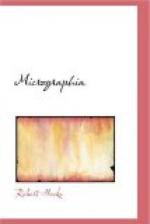The Glasses I used were of our English make, but though very good of the kind, yet far short of what might be expected, could we once find a way of making Glasses Elliptical, or of some more true shape; for though both Microscopes, and Telescopes, as they now are, will magnifie an Object about a thousand thousand times bigger then it appears to the naked eye; yet the Apertures of the Object-glasses are so very small, that very few Rays are admitted, and even of those few there are so many false, that the Object appears dark and indistinct: And indeed these inconveniences are such, as seem inseparable from Spherical Glasses, even when most exactly made; but the way we have hitherto made use of for that purpose is so imperfect, that there may be perhaps ten wrought before one be made tolerably good, and most of those ten perhaps every one differing in goodness one from another, which is an Argument, that the way hitherto used is, at least, very uncertain. So that these Glasses have a double defect; the one, that very few of them are exactly true wrought; the other, that even of those that are best among them, none will admit a sufficient number of Rayes to magnifie the Object beyond a determinate bigness. Against which Inconveniences the only Remedies I have hitherto met with are these.
First, for Microscopes (where the Object we view is near and within our power) the best way of making it appear bright in the Glass, is to cast a great quantity of light on it by means of convex glasses, for thereby, though the aperture be very small, yet there will throng in through it such multitudes, that an Object will by this means indure to be magnifi’d as much again as it would be without it. The way for doing which is this. I make choice of some Room that has only one window open to the South, and at about three or four foot distance from this Window, on a Table, I place my Microscope, and then so place either a round Globe of Water, or a very deep clear_ plano convex_ Glass (whose convex side is turn’d towards the Window) that there is a great quantity of Rayes collected and thrown upon the Object: Or if the Sun shine, I place a small piece of oyly Paper very near the Object, between that and the light; then with a good large Burning-Glass I so collect and throw the Rayes on the Paper, that there may be a very great quantity of light pass through it to the Object; yet I so proportion that light, that it may not singe or burn the Paper. Instead of which Paper there may be made use of a small piece of Looking-glass plate, one of whose sides is made rough by being rubb’d on a flat Tool with very find sand, this will, if the heat be leisurely cast on it, indure a much greater degree of heat, and consequently very much augment a convenient light. By all which means the light of the Sun, or of a Window, may be so cast on an Object, as to make it twice as light as it would otherwise be without it, and that without any




